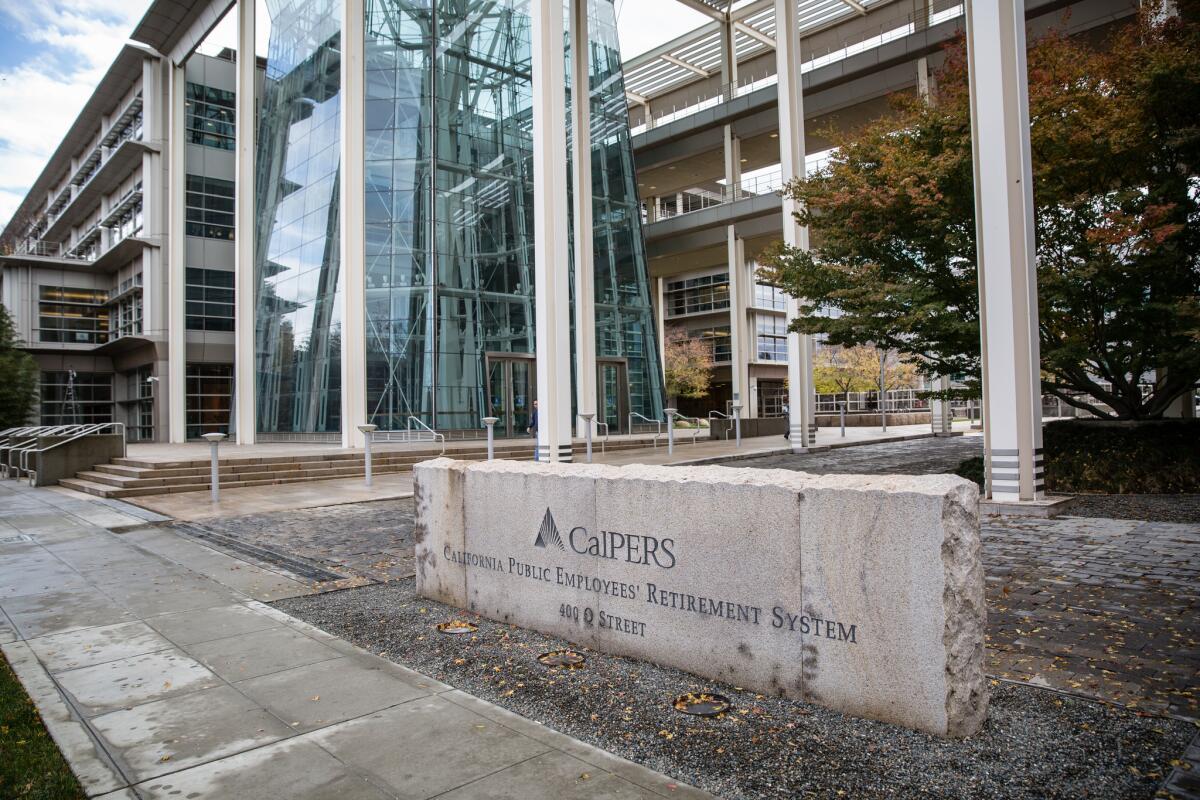CalPERS paid $3.4 billion in private equity bonuses since 1990

The California Public Employees’ Retirement System (CalPERS) building in Sacramento. On Tuesday, the nation’s largest public pension system disclosed the amount it had spent on performance fees for its controversial private equity investments.
- Share via
In a much-anticipated disclosure, the California Public Employees’ Retirement System said it paid $3.4 billion in performance fees to its private equity managers since 1990 while the controversial sector generated $24.2 billion in profits for retirees.
The nation’s largest public pension system said the portfolio’s profit-generating performance justifies the sector’s risks and complexity.
“Private equity has the highest net returns in our portfolio,” said Ted Eliopoulos, CalPERS’ chief investment officer. “As a long-term investor, it is an important piece of our investment strategy and our mission to provide pension benefits for generations to come.”
SIGN UP for the free California Inc. business newsletter >>
Still, the hefty $3.4-billion bonus figure is sure to stoke controversy about the risk and rewards of the investment style.
The high-stakes business of buying and selling whole companies, dominated by massive global players such as Carlyle Group, Kohlberg, Kravis & Roberts and Blackstone Group, has struggled to shed a swashbuckling image that dates to its roots in the go-go leveraged buyout boom of the 1980s.
Its performance fees -- generally 20% of profits over a certain threshold on top of a 2% management fee -- have evolved into a particular flashpoint. Critics see the industry’s history of failing even to disclose the amount it reaps in bonuses as a measure of its arrogance.
The industry has long argued that the bonus is a form of profit sharing and is not a fee at all.
Even so, private equity and its backers have been bracing for CalPERS’ fee disclosure since the nation’s largest pension fund announced in July that it was coming.
Tuesday morning, Invest Europe, a private equity trade group based in Brussels, released a new professional standards handbook for the industry that emphasized the need for heightened standards of “transparency and accountability,” particularly with regard to fees.
The backdrop to the fight over bonuses is a simmering public animus toward Wall Street, particularly since the financial crisis of 2008, coupled with an increasingly problematic reliance on the same financial industry to generate the investment returns needed to fund a huge portion of the nation’s retirement system.
CalPERS, for one, has been hard-pressed to keep up with looming obligations to its 1.7 current and future retirees. Its fund, now at about $295 billion, is considered about 74% funded, down from 77% as of June 30, 2014, mostly because of weak performance from its global stock portfolio.
The global stock portfolio posted returns of 1% for the last fiscal year, ended June 30. Private equity, by contrast, returned 8.9% for the year.
Private equity backers, including CalPERS, said such performance eclipses other considerations. Critics, though, questioned whether even that performance was enough to compensate for the risks inherent in the business, which involves leveraged buyouts and other direct investments in non-public companies, including startups.
Just last week, CalPERS’ board agreed to cut the fund’s expected rate of return to 6.5%, from 7.5%, though in incremental steps that could take 20 years. The move drew criticism from Gov. Jerry Brown, who urged the system to cut the expected return to 6.5% over five years to curb its reliance on higher-risk investments.
Caught in the middle are taxpayers, who must make up for investment shortfalls — a challenge for communities struggling with retirement costs they say are already unsustainable.
Twitter: @deanstarkman
ALSO
Average taxes on wireless bills in California reach a record 18%
For cable networks, holiday movies are the gift that keeps on giving
U.S. economic growth revised up for third quarter, which could ease path for Fed rate hike
More to Read
Inside the business of entertainment
The Wide Shot brings you news, analysis and insights on everything from streaming wars to production — and what it all means for the future.
You may occasionally receive promotional content from the Los Angeles Times.











